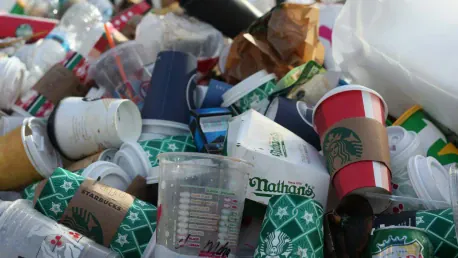Plastic pollution has emerged as one of the most pressing environmental and public health crises of our time. The pervasive presence of plastics in our environment, coupled with their detrimental health impacts, necessitates urgent global action. This article delves into the multifaceted issues surrounding plastic pollution, drawing insights from Dr. Philip Landrigan, a leading public health expert, and reflecting on recent international treaty negotiations.
The Health Hazards of Plastics
Plastics pose significant risks to human health throughout their lifecycle. From production to disposal, each stage involves exposure to harmful chemicals. During production, workers and nearby communities are exposed to toxic substances, leading to various health issues. The use of plastics, particularly by children, results in the leaching of chemicals like phthalates, which are linked to developmental problems. Upon disposal, plastics contribute to environmental pollution, releasing dioxins when burned and causing harm to wildlife and human populations.
The health implications of plastic pollution are far-reaching. Microplastics, tiny plastic particles, have been found in the air we breathe, the water we drink, and the food we eat. These particles can carry toxic chemicals into our bodies, posing serious health risks. Studies have shown that microplastics can cause inflammation, disrupt endocrine function, and even lead to cancer. The pervasive nature of plastic pollution means that no one is immune to its effects, making it a global public health concern.
Ethical and Moral Responsibilities
Addressing plastic pollution is not just a technical challenge; it is also a moral and ethical imperative. Dr. Landrigan emphasizes the need to protect children and marginalized communities who disproportionately bear the burden of plastic pollution. These vulnerable populations face higher risks from exposure to toxic chemicals, reinforcing the necessity for an ethically robust treaty.
Social justice is a key consideration in the fight against plastic pollution. Low-income communities often live near plastic production facilities and waste disposal sites, exposing them to higher levels of pollution. These communities lack the resources to mitigate the impacts of pollution, making them more vulnerable to its health effects. An effective global treaty must prioritize the protection of these populations, ensuring that the benefits of reduced plastic pollution are equitably distributed.
Unsustainable Patterns of Plastic Production
The current patterns of plastic production are unsustainable. The exponential growth in plastic production, coupled with low recycling rates, exacerbates the problem. Single-use plastics, which form a substantial part of plastic waste, are particularly problematic. These items are designed for short-term use but persist in the environment for centuries, contributing significantly to plastic pollution.
Efforts to address plastic pollution must focus on reducing the production of single-use plastics. This requires a shift towards sustainable alternatives and the implementation of policies that promote recycling and waste reduction. Governments, businesses, and individuals all have a role to play in reducing plastic waste. By adopting more sustainable practices, we can mitigate the environmental and health impacts of plastic pollution.
The Busan Treaty Negotiations
The recent treaty negotiations in Busan, South Korea, highlighted the challenges of reaching a global consensus on plastic pollution. Despite the optimism and hope for a comprehensive treaty, the negotiations did not result in a consensus. Countries like Saudi Arabia and Russia blocked progress, underscoring the political complexities involved in addressing this issue.
The proposed treaty is seen as essential for global public health. Key provisions include caps on plastic production and the management of toxic chemicals within plastics. The High Ambition Coalition, a group of nations advocating for strict controls, has called for a scientifically-based treaty. Their resolve to resist weak agreements suggests that a stronger global approach might eventually emerge with persistent efforts.
Hope for Future Negotiations
Despite the setbacks in Busan, there is hope for future negotiations. Dr. Landrigan remains optimistic that a strong treaty can be achieved, driven by scientific evidence and moral courage. The High Ambition Coalition’s commitment to strict controls and a scientifically-based approach provides a foundation for future progress.
The path to an effective global treaty will require continued advocacy and collaboration. Scientists, policymakers, and activists must work together to build consensus and push for meaningful action. By leveraging scientific evidence and ethical considerations, we can create a treaty that addresses the root causes of plastic pollution and protects public health.
The Role of the Catholic Church
Plastic pollution has become one of the most significant environmental and public health challenges of our era. With plastics infiltrating our ecosystems and their harmful effects on health becoming increasingly apparent, there’s a dire need for global intervention. This pressing issue involves myriad complexities, as highlighted by Dr. Philip Landrigan, a renowned public health authority. His insights underscore the severe health consequences of plastic pollution, which include a range of medical conditions arising from exposure to microplastics and associated chemicals.
Moreover, the global community has recognized the gravity of this situation, leading to recent international treaty negotiations aimed at curbing plastic pollution. These negotiations reflect a unified acknowledgment among nations of the urgent need to address this crisis collaboratively.
By delving into the intricacies of plastic pollution, this article examines its far-reaching impacts, from disrupting marine life to infiltrating the human food chain. It also considers the broader implications for public health and the environment, emphasizing the critical need for concerted action.
Understanding the magnitude of plastic pollution and its ramifications is essential in fostering effective solutions. By integrating scientific research, policy development, and innovative strategies, the global effort to combat this environmental threat can pave the way for a healthier future for both people and the planet.









